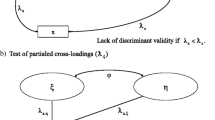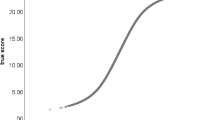Abstract
It is shown that the scoring algorithm for maximum likelihood estimation in exploratory factor analysis can be developed in a way that is many times more efficient than a direct development based on information matrices and score vectors. The algorithm offers a simple alternative to current algorithms and when used in one-step mode provides the simplest and fastest method presently available for moving from consistent to efficient estimates. Perhaps of greater importance is its potential for extension to the confirmatory model. The algorithm is developed as a Gauss-Newton algorithm to facilitate its application to generalized least squares and to maximum likelihood estimation.
Similar content being viewed by others
References
Bard, Y. (1974).Nonlinear parameter estimation. New York: Academic Press.
Bentler, P. M. (1983). Some contributions to efficient statistics in structural models: specification and estimation of moment structures.Psychometrika, 48, 493–517.
Bentler, P. M. (1984).Theory and implementation of EQS, a structural equations program. Los Angeles: BMDP Statistical Software.
Browne, M. W. (1974). Generalized least squares estimation in the analysis of covariance structures.South African Statistical Journal, 8, 1–24.
Clarke, M. R. B. (1970). A rapidly convergent method for maximum-likelihood factor analysis.The British Journal of Mathematical and Statistical Psychology, 23, 43–52.
Hägglund, G. (1982). Factor analysis by instrumental variables.Psychometrika, 47, 209–222.
Hartley, H. O., & Booker, A. (1965). Nonlinear least squares estimation.Annals of Mathematical Statistics, 36, 638–650.
Hotelling, H. (1933). Analysis of a complex of statistical variables into principal components.Journal of Educational Psychology, 24, 417–444, 498–520.
Jennrich, R. I., & Robinson, S. M. (1969). A Newton-Raphson algorithm for maximum likelihood factor analysis.Psychometrika, 34, 111–123.
Jennrich, R. I., & Sampson, P. F. (1978). Some problems faced in making a variance component algorithm into a general mixed model program.Computer Science and Statistics: Eleventh Annual Symposium on the Interface (pp. 56–63). Raleigh, NC: North Carolina State University, Institute of Statistics.
Jöreskog, K. G. (1967). Some contributions to maximum likelihood factor analysis.Psychometrika, 32, 443–482.
Jöreskog, K. G., & Sörbom, D. (1981). LISREL 5: Analysis of linear structural relationships by maximum likelihood and least squares methods (Research Report 81-8). Uppsala, Sweden: University of Uppsala, Department of Statistics.
Kelley, T. L. (1935). Essential traits of mental life.Harvard Studies in Education, 26. Cambridge, MA: Harvard University Press.
Lawley, D. N., & Maxwell, M. A. (1971).Factor analysis as a statistical method. New York: Elsevir.
Lee, S. Y., & Jennrich, R. I. (1979). A study of algorithms for covariance structure analysis with specific comparisons using factor analysis.Psychometrika, 44, 99–113.
Luenberger, D. G. (1973).Introduction to linear and nonlinear programming. Reading, MA: Addison-Wesley.
Madansky, A. (1964). Instrumental variables in factor analysis.Psychometrika, 29, 105–113.
Rubin, D. B., & Thayer, D. T. (1982). EM algorithms for ML factor analysis.Psychometrika, 47, 69–76.
Author information
Authors and Affiliations
Additional information
This research was supported by NSF Grant MCS-8301587.
Rights and permissions
About this article
Cite this article
Jennrich, R.I. A gauss-newton algorithm for exploratory factor analysis. Psychometrika 51, 277–284 (1986). https://doi.org/10.1007/BF02293985
Received:
Revised:
Issue Date:
DOI: https://doi.org/10.1007/BF02293985




